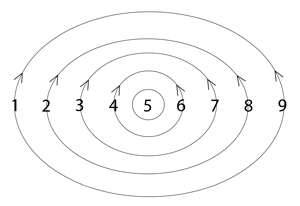emotion
8-2-1
Conventional Understanding
We typically think of emotions as internal feelings that happen to us—happiness when things go well, anger when they don’t. Society teaches us to “manage” these reactions like they’re unruly pets. “Don’t let emotions control you,” they say. This limited view creates a culture that either suppresses feelings as unprofessional or indulges them dramatically. By seeing emotions as just subjective reactions, we’ve missed their true role as sophisticated measurement systems that provide crucial information about our relationship to life.
Resonant Understanding
Word Cosmology reveals “emotion” shares its pattern (8-2-1) with “indicator of pressure” and “attention field,” showing emotions aren’t random reactions but precise measurement systems. Like a barometer that doesn’t create weather but displays atmospheric pressure, emotions don’t cause our circumstances—they measure our relationship to them. Imagine standing in a river—face downstream and you feel smooth flow; turn sideways and you immediately feel pressure against your body. The water hasn’t changed, but your relationship to it has. Your body registers this instantly. Emotions work the same way, measuring your alignment with life’s currents.
Expressions Spectrum Analysis
In balanced expression, emotions serve as clear gauges—”governance gauge” and “activated desire” show precise measurement without distortion. “Correspond” reveals exact registration of our relationship to what we’re engaging with. “I am that idea” shows how balanced emotion dissolves the boundary between feeling and feeler—you don’t just have emotions; you are the reading itself.
When over-modulated, emotions appear as “amplify” and “inflammation”—pressure readings in the red zone. “Projected matrix” shows rigid interpretative frameworks that distort rather than measure accurately. “Nationalism” demonstrates how collective high-pressure states create artificial boundaries. “Struggle” reveals the friction that emerges when we resist natural flow.
Under-modulated emotions appear as “contain desire” and “controlled”—pressure readings too low to register significant changes. “Burden” shows the heaviness of insufficient measurement. “Need to need” reveals a system so disconnected it can’t even register what it lacks. “Free floating” shows ungrounded states without clear connection to what’s being measured.
Beyond these patterns, words like “creating process,” “gravitation,” “radiation,” and “logarithmic spiral” share this resonance, suggesting fundamental principles at work in how emotions function.
Russell’s Cosmogony Connection
Walter Russell described a universe of varying pressure conditions, writing:
“Electricity thus performs the ‘work’ of the world by straining toward separateness… and relaxing from such resisted strains and tensions…”
This is exactly what emotions measure—the strain or relaxation in our relationship with life’s unfolding. Emotions aren’t things but readings of relationship.
Picture standing in a tide pool—feeling water simultaneously pulling outward and pushing inward. This dual awareness is precisely what emotion provides—a reading of the rhythmic interchange between opposing forces that Russell calls the universal heartbeat.
Practical Implications
This understanding transforms how we relate to emotions. Instead of trying to “fix” them, we can recognize them as precise indicators. You wouldn’t change a thermometer reading without changing the temperature.
This shifts emotional intelligence from control to accurate reading:
– Anger isn’t “bad”—it indicates high pressure in your relationship with something seeking expression
– Joy isn’t just pleasant—it’s a reading of alignment with creative flow
– Anxiety isn’t weakness—it’s your system measuring resistance patterns
Collectively, emotional struggles aren’t personal failings but accurate readings of systemic pressure conditions. By treating emotions as sophisticated measurement systems rather than problems, we open to a more authentic relationship with both our individual nature and our collective experience. We stop fighting the gauges and start understanding what they’re measuring.
Walter Russell’s quotes are from his book, “A New Concept of the Universe”.


